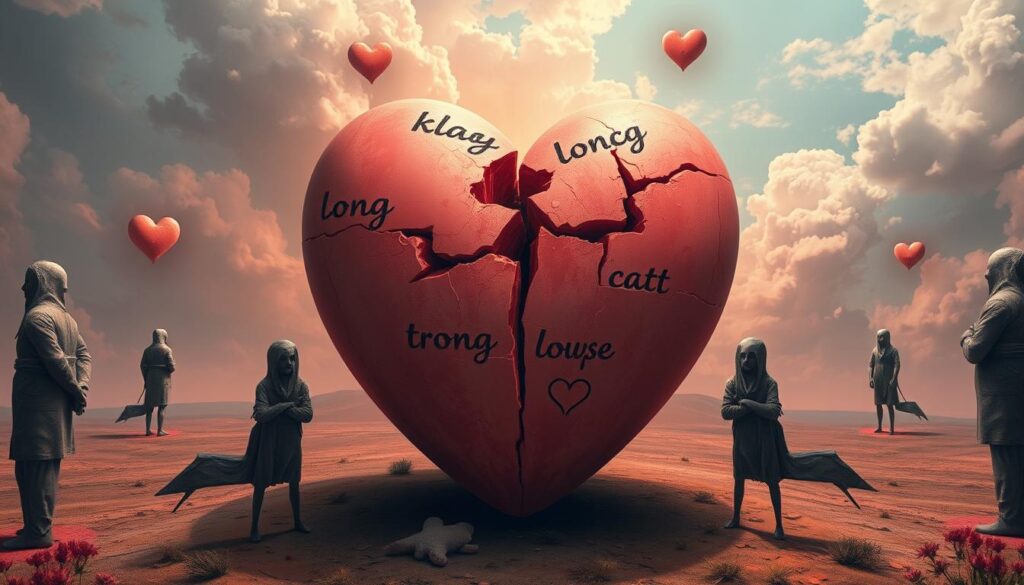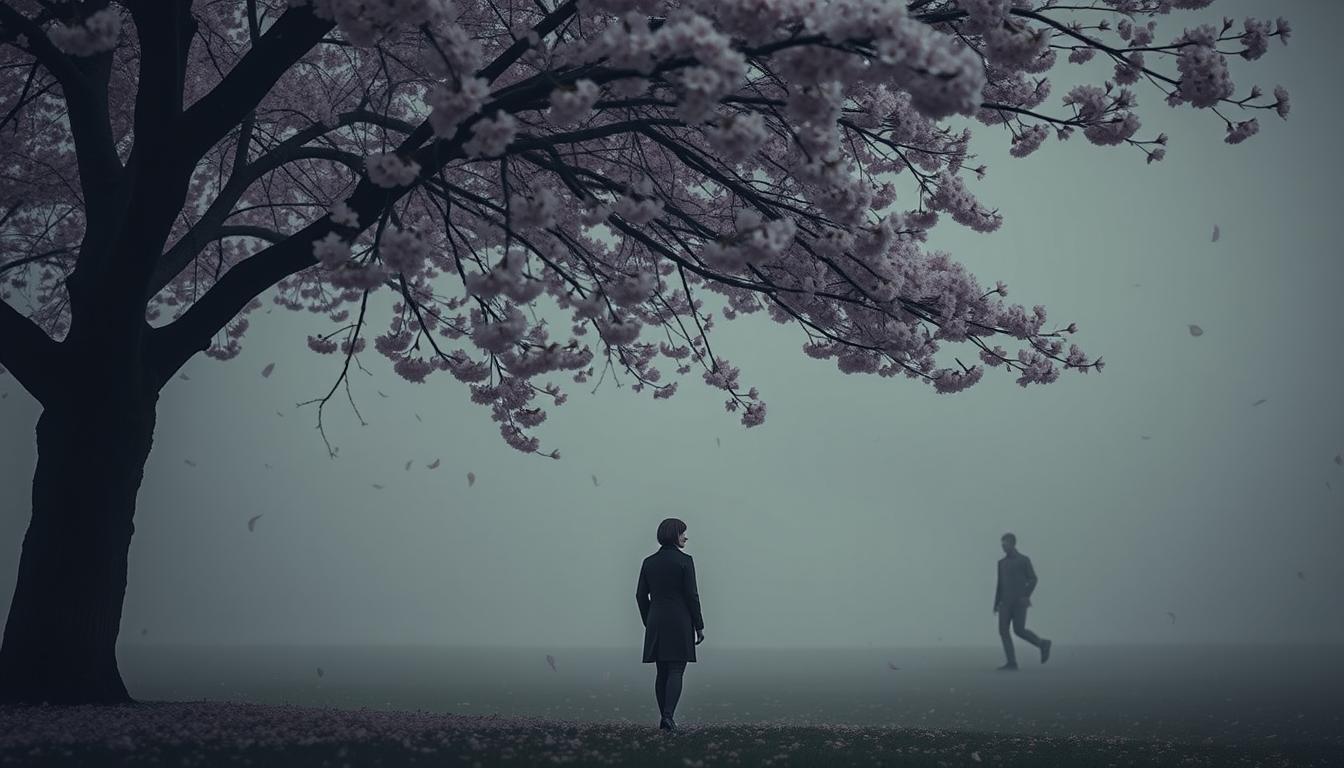Unrequited love is a painful experience many face. It’s when one person’s love isn’t returned. This can deeply affect someone’s emotional state.
It’s important to understand these one-sided relationships. They impact our mental health and how we connect with others.
This article will look at unreturned affection’s effects. We’ll explore why it’s so complex. It can lead to feelings of rejection and loneliness.
These feelings can hurt our self-esteem and daily life. We’ll share insights and ways to deal with unreturned love.
Understanding Unreturned Affection
Unreturned affection, or one-sided love, is a common feeling. It happens when romantic feelings are not shared back. This can be in secret crushes or when someone openly shares their feelings but gets rejected.
Definition and Context
When someone’s romantic feelings aren’t shared back, it’s called unreciprocated feelings. This can happen in many ways. It might be a secret crush, an unbalanced friendship, or confessing feelings only to get rejected.
It’s important to understand this to deal with the emotional side of unreciprocated love.
Common Experiences
Those who feel unreciprocated love go through many emotions. They might feel hopeful or deeply sad. The longing and sadness can be very hard to handle.
It can happen to anyone, like a teenager in love with a classmate or an employee with a crush on a colleague. Many people will experience this at least once in their lives.
The Emotional Impact of Unreturned Love
Unreturned love can make you feel a mix of emotions. It can lead to deep heartbreak and emotional trauma. Understanding these feelings is key to moving forward.
Feelings of Rejection
Not getting the love you want can hurt a lot. You might feel sad, worthless, and broken-hearted. It makes you wonder if you’re good enough.
Loneliness and Isolation
Feeling alone is common when love isn’t returned. It feels like you’re on your own in a big sea. This feeling can make you pull away from friends, fearing they’ll judge you.
Coping Mechanisms
People find different ways to deal with the pain. Some stay alone, while others seek help from therapists. Healing can also mean trying new things, like hobbies or mindfulness.
Every person’s path is different. But the goal is the same: to find your worth and feel better again.
The Role of Attachment Styles
Attachment styles help us understand how we form emotional bonds. They shape how we feel when love isn’t returned. These styles include secure, anxious, and avoidant, each affecting how we handle emotional pain.
Secure attachment helps us deal better with unreturned love. It makes us more resilient and able to form strong bonds. People with secure attachment are more confident in their relationships.
Anxious attachment makes it hard to handle unreturned love. Feeling rejected can cause a lot of anxiety. This can lead to a cycle of wanting closeness but fearing loss.
Those with avoidant attachment might seem distant when love isn’t returned. They might not show their emotional needs. But, this style hides deep desires for connection.
Looking at attachment styles shows how early experiences shape our adult emotions. Knowing these patterns helps us cope better with unreciprocated love. It leads to personal growth and healthier relationships in the future.
Unreturned Affection and Self-Esteem
Unrequited love can really hurt your self-esteem. It’s key to see how unreturned love affects your self-worth. This part talks about how to deal with these feelings to grow stronger and more confident.

Influence on Self-Worth
Facing unreturned love can make you doubt yourself. You might wonder if you’re attractive or valuable. This can lower your self-confidence.
Being rejected often makes this feeling worse. It’s important to understand these feelings to start healing and growing.
Ways to Build Resilience
To stay strong when love isn’t returned, building resilience is key. Taking care of yourself, like through mindfulness, is helpful. Also, trying new things and learning can boost your self-image.
Understanding your feelings is a big step. It helps you manage rejection better. This way, you can grow stronger against the pain of unreturned love.
Psychological Theories Behind Unreturned Affection
Understanding why some people feel unreciprocated love is key. The idea of romantic idealization is important here. It means people often see their love interest as perfect, ignoring their flaws.
Limerence is another big theory. It’s a strong, unwanted longing for someone. This feeling makes it hard to let go, even when love isn’t returned. It can lead to obsessive thoughts and a strong need for the other person.
Intermittent reinforcement also affects unreturned love. This happens when the loved one responds sometimes, but not always. This makes the emotional bond stronger. It keeps people hoping and emotionally tied, even without love back.
Looking into these theories helps us understand unreturned love better. We see how romantic idealization, limerence, and intermittent reinforcement shape our feelings. This deep dive into love psychology shows why some keep loving, even when it’s not returned.
The Role of Social Media in Unrequited Love
In today’s world, social media plays a big role in our feelings, including unrequited love. It makes it easy to see updates and talk to others online. This can make it harder to deal with unrequited love.
Impact of Digital Interactions
Platforms like Instagram, Facebook, and Twitter can make unrequited love worse. Every post, like, or comment can hurt. It’s hard to forget someone when you see their life online.
Managing Expectations Online
It’s important to manage your online expectations. Setting boundaries and taking breaks from social media can help. Being mindful of how you use social media can make it easier to handle unrequited love.
Real-life Stories of Unreturned Affection
Many have shared their stories of unreturned love. These stories give us a peek into their emotional journeys. One person’s love story started with hope but ended in heartbreak.
Their love grew stronger every day. But, they realized the other didn’t feel the same way.
These stories show how people deal with unreturned love. Some write poetry or letters that never reach their loved ones. Others turn to friends and family for support.
These stories teach us about self-worth and resilience. Dealing with unreciprocated love helps us grow. It helps us understand our needs and boundaries better.
These tales are painful but show our ability to love deeply. They remind us that we’re not alone. Others have faced similar challenges and come out stronger.
Cultural Perspectives on Unrequited Love
Unrequited love has fascinated people for centuries. It has been seen differently in ancient times and today. This section explores how cultures view unreturned love, looking at old and new views, societal attitudes, and cultural differences.
Historical Views
For a long time, unrequited love has been a big theme in stories, art, and philosophy. Ancient Greek tragedies saw unreturned love as a divine punishment or a flaw. Medieval European stories made unattainable love seem noble and a noble suffering.
In many Eastern cultures, traditional values shaped how people saw unrequited love. Here, being rejected was often seen as a normal part of life.
Modern Interpretations
Today, how we see unrequited love has changed. This is due to new romantic norms and global connections. Now, people respond differently to unreturned love, from accepting it to keeping trying.
In Western societies, people often focus on growing and learning after being rejected. But in some Eastern cultures, unrequited love still carries deep emotional weight. This is because of cultural and family expectations.
Common Myths and Misconceptions
Unrequited love is often filled with misconceptions that make our pain worse. One big myth is that keeping trying will always work. But, chasing someone who doesn’t feel the same can hurt more, not less.
Another myth is that not getting love back means we’re not good enough. Many people think rejection shows they’re not worthy. But, research shows unrequited love is common and doesn’t mean we’re failing.
Seeing this truth can help us feel better about ourselves.
These myths make us expect too much and suffer needlessly. By clearing up these myths, we can understand love and relationships better. This leads to a kinder and more realistic view of human feelings.
How to Move Forward from Unreturned Affection
Dealing with unreturned affection is tough, but you can move on. The right steps and support can help a lot. It’s all about finding ways to cope and getting the right help.
Practical Steps
Healing starts with acknowledging your feelings and grieving. Take care of yourself by doing things you love. This could be exercise, hobbies, or just hanging out with friends.
Mindfulness and journaling can also help. They let you process your emotions and find your way back to happiness.
Seeking Professional Help
At times, you might need help from a professional. Therapy offers a safe place to talk about your feelings. It’s a chance to get support and learn how to deal with your emotions.
Therapists can give you strategies that fit your situation. They help you overcome heartache and build strength for the future.
Artists and Literature Depicting Unrequited Love
Romantic literature has always explored the deep feelings of unrequited love. Famous writers like William Shakespeare and Emily Brontë wrote stories that still move us today. Their works, like “Romeo and Juliet” and “Wuthering Heights,” show how love can last forever.
Artists have also shown unreturned love in many ways. Vincent van Gogh’s paintings, for example, show the intense feelings of love that wasn’t returned. His bold colors and strokes tell a story of longing and loneliness, touching everyone who sees them.
Today, music and movies also talk about unrequited love. Artists like Adele and Taylor Swift write songs that express these feelings. Movies like “500 Days of Summer” and “La La Land” show how unreturned love affects people in different ways.
Looking at unrequited love in literature and culture shows it’s a common feeling. Whether through books, art, or movies, expressing unreturned love helps many people feel less alone. It offers comfort and understanding to those who have felt the same way.
The Complexity of Unreturned Affection: Psychological Insights
Unreturned affection can create a maze of emotions. It can deeply affect a person’s mind. When love is not shared, it leads to deep thinking and a need to understand it better.

From a psychological view, unreturned love comes from early life patterns. These patterns shape how we see love. They affect how we act when love is not returned. Understanding these patterns can change a person’s life.
Unreturned love also needs a lot of emotional strength. When love is not returned, it can hurt a lot. Psychological help is key to navigating these feelings.
Understanding unreturned love shows how important it is to look into our minds. Each case of unreturned love is different. This means we need to look at each situation closely. This way, we can heal and grow stronger.
Role of Communication in Managing Expectations
Good communication is key when dealing with unreturned feelings. It helps you share your feelings clearly and set boundaries. This can improve your emotional health and relationships.
Expressing Feelings
Being open about your feelings is important. Talk about how you feel in a respectful way. Use “I” statements to share your emotions without blaming others.
For example, saying “I feel sad when my feelings aren’t reciprocated” helps understand each other better. Emotional intelligence helps you manage your feelings during these talks.
Healthy Boundaries
Setting boundaries is crucial when dealing with unreturned feelings. It keeps your emotional health safe and prevents distress. Know what you’re okay with and share these limits clearly and kindly.
You might say, “I need some space to process my feelings.” This way, you handle the situation without feeling resentful. Practicing these skills keeps your mental health strong and helps build better relationships.



